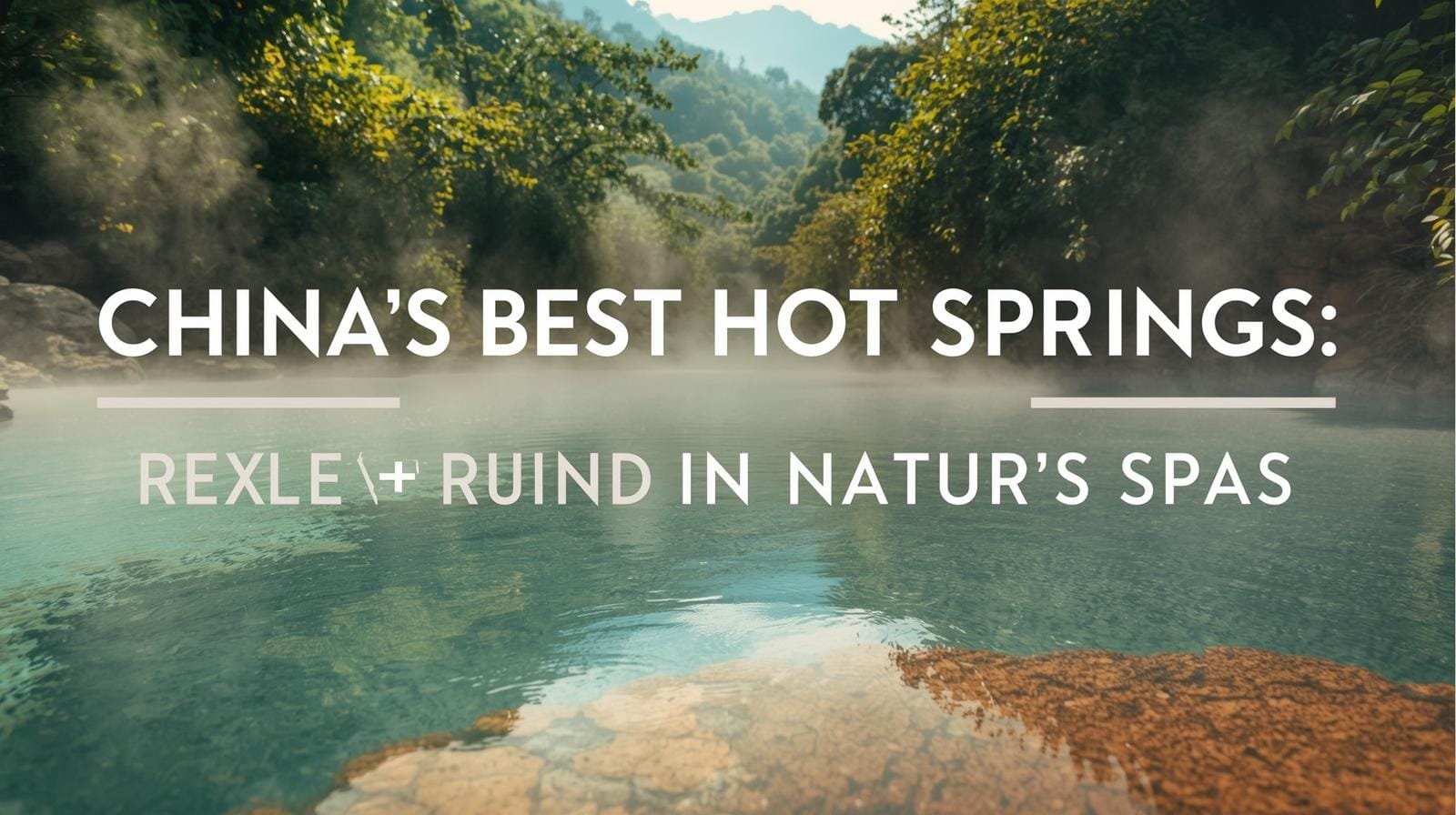China’s Best Hot Springs: Relax and Unwind in Nature’s Spas
Imagine soaking in crystal-clear, mineral-rich waters amidst breathtaking landscapes, where ancient traditions meet modern relaxation. China hot springs have long been a haven for travelers seeking rejuvenation, blending the therapeutic benefits of natural hot springs China with the country’s rich cultural heritage. Whether you’re a weary adventurer or a wellness enthusiast, these spots offer the ultimate escape, making them perfect for China wellness travel. Here at jusha.travel, we love sharing tips to make your China journey unforgettable, and today, we’re diving into the best of these natural wonders to help you relax and unwind. For more on China’s scenic escapes, check out this guide to Guilin’s landscapes.
From the misty mountains of the south to the snowy peaks of the north, China hot springs are renowned for their healing properties and serene settings. In this post, we’ll explore top destinations that embody relaxing China hot springs and highlight why they should be on every traveler’s itinerary. Let’s embark on a virtual soak through some of China’s most enchanting spa oases, drawing from trusted sources like Trip.com and China Travel for authentic insights. Learn about China’s top historical sites, which might complement these natural wonders, via our historical guide.
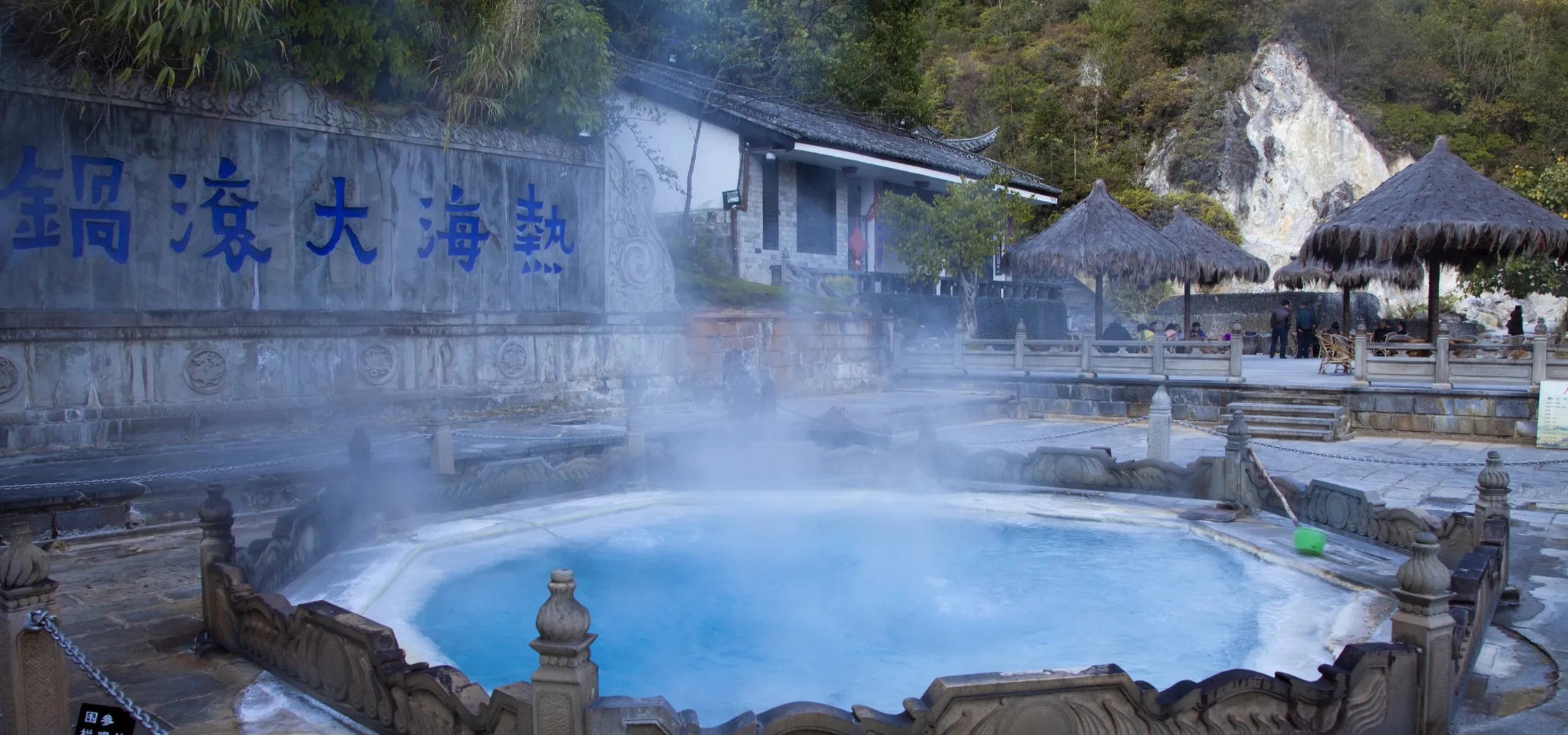
Southern Gems: Relaxing Hot Springs in Guangdong and Beyond
When it comes to relaxing China hot springs, the southern regions of China steal the show with their tropical vibes and lush surroundings. Guangdong province, in particular, boasts some of the country’s most accessible and therapeutic springs, perfect for those new to China wellness travel. One standout is Conghua Hot Spring, often called the “premier hot spring in Lingnan,” where mineral-rich waters have been cherished since the Ming and Qing dynasties. [China Hot Spring Explore the Unique Hot Springs Across – https://hk.trip.com/blog/china-hotspring/?locale=en_hk]. If you’re planning more adventures around China, this budget travel guide could help.
At Conghua, you’ll find resorts like Bishuiwan and Xianmu Garden, blending classic Chinese design with modern spa facilities. The waters, clear and tasteless, are packed with minerals that improve skin health, circulation, and even relieve stress—a true testament to China spa destinations. Nearby, Cloud Nine Hot Spring at Nankun Mountain offers a secluded escape in primeval forests, with pools evoking a Balinese paradise. As you gaze over rolling hills, the combination of warm waters and cool mountain air creates an unparalleled sense of tranquility. For hiking enthusiasts, check out these hiking trails.
For a deeper cultural tie-in, remember that hot springs in China are more than just a soak; they’re rooted in traditional wellness practices. Many locals incorporate herbal infusions or flower petals into their baths, drawing from ancient TCM (Traditional Chinese Medicine) principles. If you’re planning a trip, the best time to visit these southern spots is year-round, but winter adds a magical mist that enhances the experience. According to experts at China Travel, these areas are ideal for first-timers, offering a gentle introduction to natural hot springs China. [Top 7 Hot Springs Resorts in China – https://www.chinatravel.com/guide/best-china-hot-springs]. To dive deeper into China’s cultural gems, this festival guide is essential.
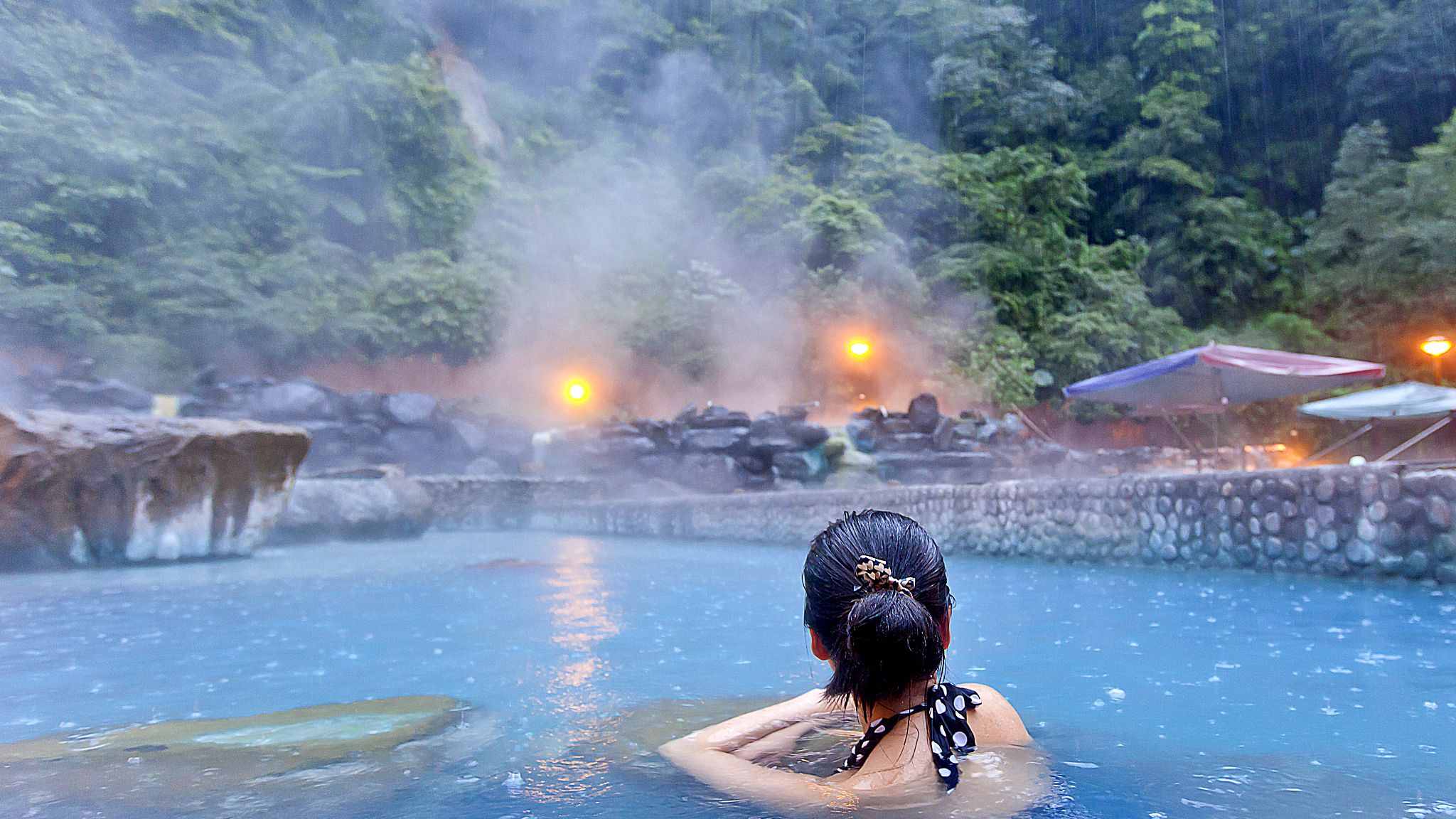
Northernet and Western Wonders: Natural Hot Springs for Adventure Seekers
Venture north and west, and you’ll discover natural hot springs China that cater to thrill-seekers and winter lovers alike. In Liaoning province, Yingkou Hot Springs stand out as a winter favorite, with sulfur-rich waters that soothe arthritis and skin conditions while providing a cozy retreat from the cold. The “rotten egg” scent might seem off-putting at first, but it’s a sign of the high mineral content that makes these springs so effective for China wellness travel. For more on China’s adventurous spots, take a look at these scenic routes.
Further afield, Tengchong in Yunnan offers a dramatic volcanic backdrop, with over 80 natural sources in the Rehai (“Hot Sea”) park. Imagine bubbling pools and geothermal lakes set against lava landscapes—it’s like stepping into a geothermal wonderland. These springs, rich in minerals, not only promote relaxation but also reflect China’s geological diversity, a reminder of the country’s ancient volcanic activity. As noted in a detailed exploration by China Exploration, Tengchong’s small-town vibe is ideal for invigorating experiences. [Hot and cold: China’s best hot springs – https://www.chinaexploration.com/News/china-best-hot-springs.html]. Dive into China’s natural escapes with this hiking guide.
Don’t miss Mount Huangshan in Anhui, a UNESCO World Heritage site where hot springs flow from granite depths. The mildly acidic waters, infused with metasilicic acid, are perfect for improving circulation and skin vitality. Paired with the iconic craggy peaks and bamboo forests, it’s an experience that marries adventure with serenity. For practical tips, pack light layers for varying temperatures and consider a visit in the off-peak season to avoid crowds—enhancing your connection to these relaxing China hot springs. To plan your China itinerary, review this budget guide.
If food is your thing, pair your soak with local specialties. In Yunnan, try the region’s famous hot pot, infused with herbs that echo the therapeutic themes of the springs. This blend of China spa destinations and culinary delights exemplifies how travel in China is about holistic experiences. For more culinary discoveries, check out this food guide.
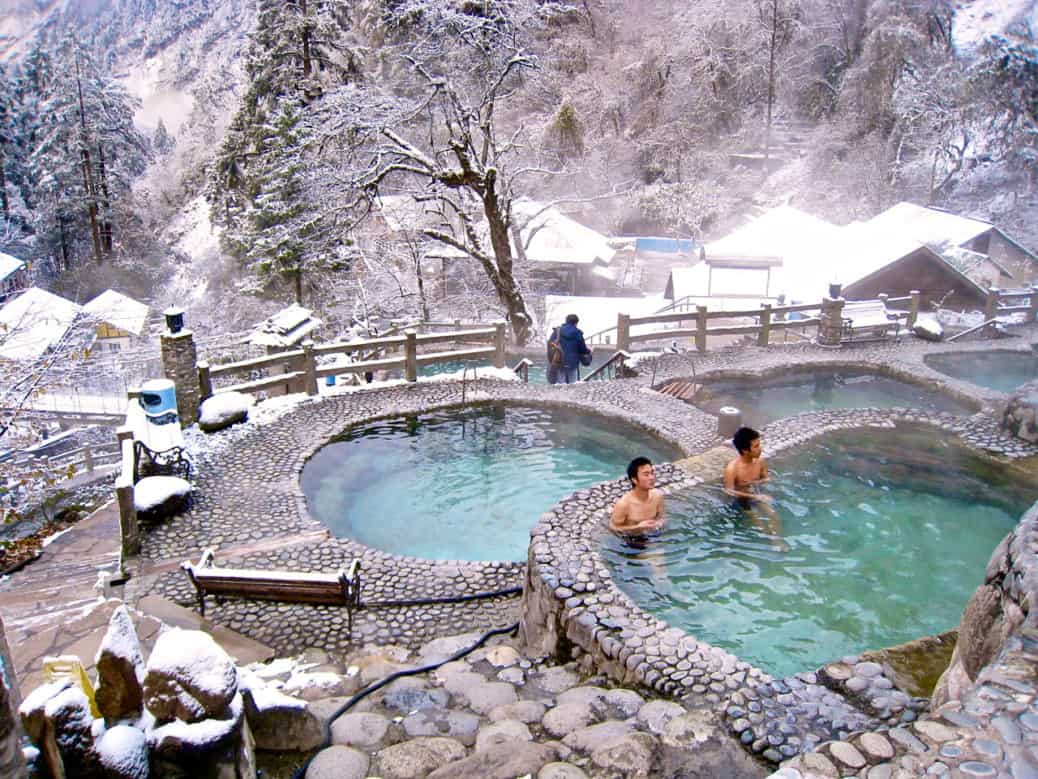
Iconic Spa Destinations: From Chongqing to Zhejiang for Ultimate Wellness
China’s central and eastern regions are home to some of the most luxurious China spa destinations, where hot springs are seamlessly integrated into cultural and modern settings. Chongqing, often called the “hot spring capital,” features historic sites like the South Hot Springs, with over 40 pools at resorts such as Tongjing. Nestled amid bamboo hills, these springs offer privacy and elegance, drawing from the Wentang River for a truly immersive experience. As travel writers have shared, it’s an unforgettable blend of nature and luxury. For transport to such spots, this guide on high-speed rail is helpful.
In Zhejiang, the Wuyi Tangfeng Open-Air Hot Spring stands out with its poetic heritage, featuring nearly 20 garden-style pools fed by waters reaching 45°C. This spot, known as the “Huaqing Pool of Central Zhejiang,” ties into China’s literary traditions, where poets once sought inspiration in these very waters. For China wellness travel, it’s a chance to experience selenium-rich springs, like those at Mingyue Mountain in Jiangxi, which have been used for over 800 years for their skin-enhancing properties. To explore more literary connections, visit this historical guide.
Culturally, hot springs in China often incorporate elements of Taoism and balance, emphasizing harmony with nature. A fun fact: some springs are so hot they can boil eggs, as seen at Changbai Mountain’s Julong Hot Spring in Jilin. This makes them not just relaxing spots but also interactive cultural experiences. When visiting, opt for resorts that offer private tubs for a personalized touch, and don’t forget to try local teas or snacks to enhance the wellness vibe. For more regional attractions, check out this hiking trail guide.
According to Tripadvisor’s rankings, these destinations consistently top lists for their combination of scenery and health benefits, making them essential for any China hot springs itinerary. [THE 15 BEST China Hot Springs & Geysers – https://www.tripadvisor.com/Attractions-g294211-Activities-c57-t61-China.html]. Enhance your journey with insights into historical places.
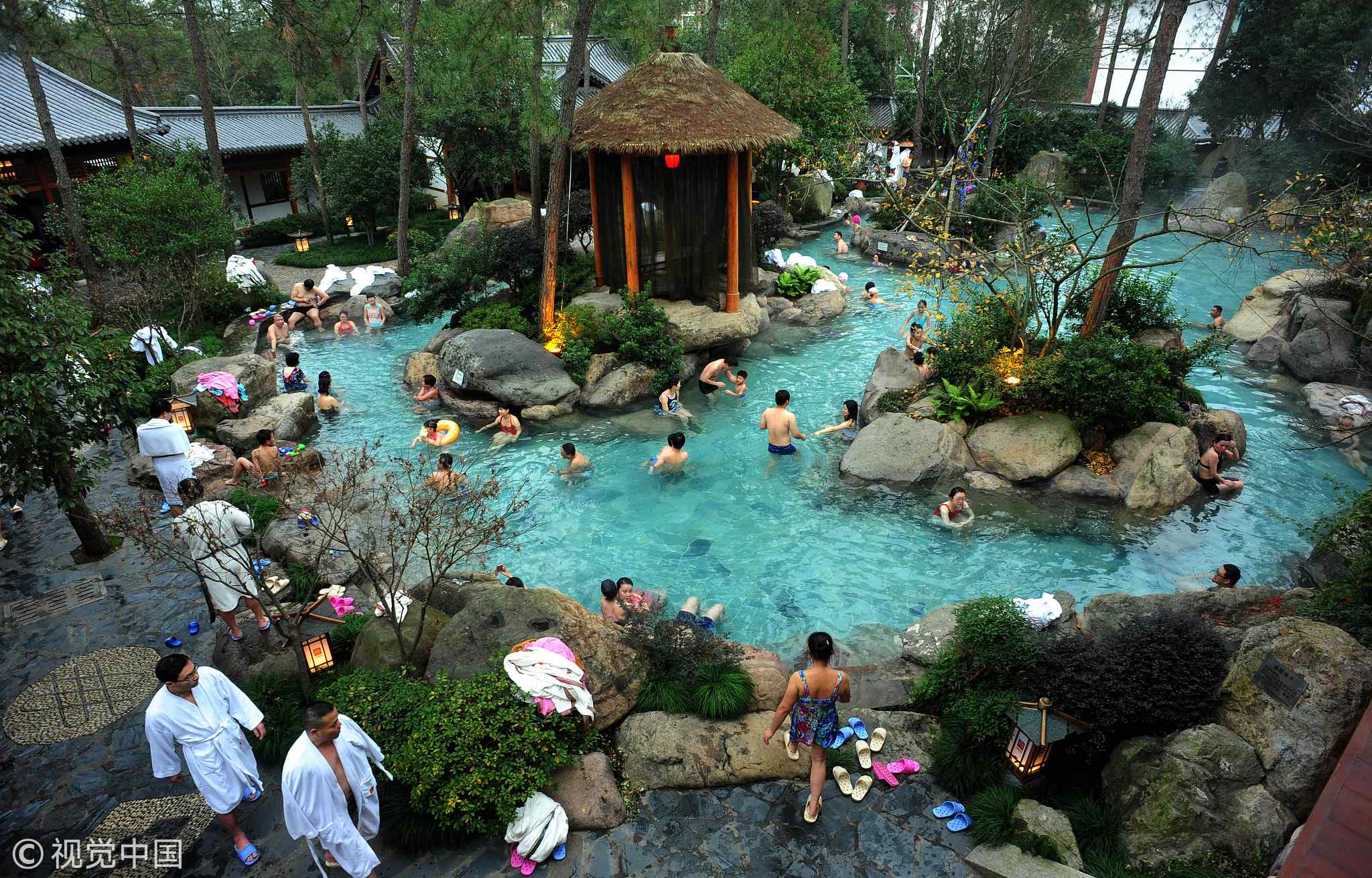
Practical Tips and Cultural Insights for Your Hot Springs Adventure
To make the most of your China hot springs experience, here are some practical tips and cultural nuggets. First, check the water temperature and facilities in advance—many resorts offer indoor and outdoor options, ideal for varying weather. For safety, hydrate well and limit your soak to 20-30 minutes to avoid overheating. When it comes to relaxing China hot springs, timing is key; winters in northern areas like Daqing provide a stark contrast with snowy landscapes, while summer visits to southern spots enhance the tropical feel. For more on seasonal planning, this planning guide will help.
Culturally, hot springs are tied to concepts of “qi” (life energy) in Chinese philosophy, often used for detoxification and balance. In Tibetan-influenced areas like Ganzi in Sichuan, springs are part of ancient rituals, offering a glimpse into ethnic minority traditions. Food-wise, complement your trip with nourishing dishes like Yunnan yogurt or Anhui green tea, which align with the wellness theme. For culinary inspiration, explore Chinese dishes.
Technology plays a role too—many modern resorts in China spa destinations feature apps for booking and health tracking, reflecting China’s innovative spirit. For sustainable travel, choose eco-friendly resorts that preserve natural sources. Remember, natural hot springs China are about more than relaxation; they’re a gateway to understanding the country’s diverse landscapes and heritage. Dive deeper into China’s sustainable options with this hiking guide.
In conclusion, exploring China hot springs is an invitation to reconnect with nature and yourself, whether you’re chasing relaxing China hot springs in the south or embarking on China wellness travel in the mountains. These destinations offer a perfect mix of therapy, culture, and adventure, making them essential for any trip to China. At jusha.travel, we’re passionate about guiding you through these experiences, so visit our site for more tips and itineraries to plan your next escape. For more cultural insights, check out Chinese festivals.

